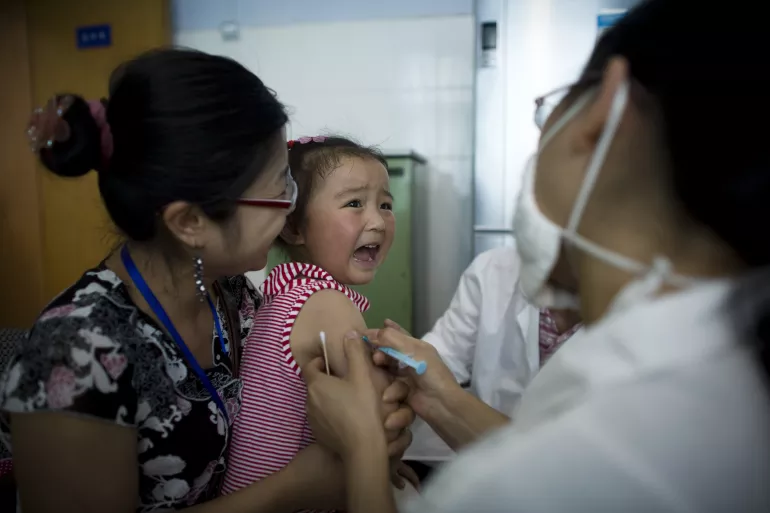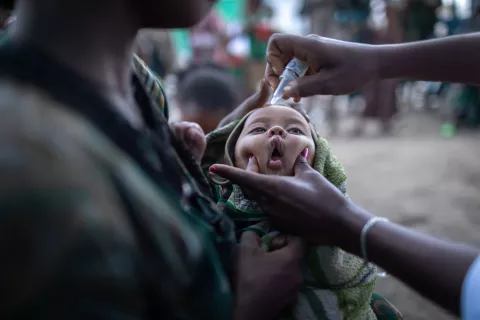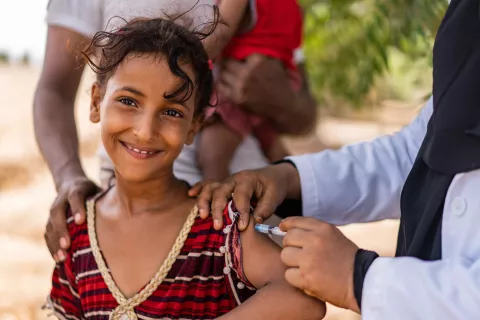Two-thirds of unimmunized children live in conflict-affected countries - UNICEF
World Immunization Week - 24-30th April

- Available in:
- 中文
- English
NEW YORK/GENEVA, 22 April 2016 – Almost two-thirds of children who have not been immunized with basic vaccines live in countries that are either partially or entirely affected by conflict, UNICEF said ahead of World Immunization Week.
Of countries in conflict, South Sudan has the highest percentage of unimmunized children, with 61 per cent not receiving the most basic childhood vaccines, followed by Somalia (58 per cent) and Syria (57 per cent).
“Conflict creates an ideal environment for disease outbreaks,” said UNICEF Chief of Immunization Robin Nandy. ”Children miss out out on basic immunizations because of the breakdown – and sometimes deliberate destruction – of vital health services. Even when medical services are available, insecurity in the area often prevents them from reaching children.”
Measles, diarrhoea, respiratory infections and malnutrition are major causes of childhood illness and death, and in conflict and emergencies, their effects can worsen. When children contract measles in non-conflict settings, fewer than 1 per cent of them die. In areas where crowding and malnutrition are rife, such as refugee camps, child deaths from measles can soar to up to 30 per cent of cases. Overcrowding and lack of basic necessities like food, water and shelter make children even more vulnerable to disease.
Areas in conflict also see the killing of health workers and the destruction of medical facilities, supplies and equipment, all of which have a disastrous effect on children's health.
- Conflict-affected areas in Pakistan and Afghanistan are the last remaining strongholds of the crippling poliovirus, now eliminated from the rest of the world.
- In Syria, immunization levels have plummeted from over 80 per cent in 2010, prior to the conflict, to 43 per cent in 2014. Polio resurfaced in the country in 2013, after 14 years with no cases.
- In the Democratic Republic of Congo, over 2,000 suspected cases of measles have already been reported in 2016, with 17 deaths, most of them among children under 5 years old.
Vaccination – particularly against highly contagious measles – is a high priority in humanitarian emergencies and is a central part of UNICEF's response to protect children's health in such settings.
- In Syria, a vaccination campaign planned to start on 24 April will target young children who have missed out on routine vaccination, especially those in besieged and hard-to-reach areas. Many of these children, born since the conflict began, have never been vaccinated.
- In Yemen, despite fierce fighting across the country, UNICEF-supported vaccination campaigns immunized 2.4 million children against measles and rubella in January and 4.6 million children against polio in April 2016.
- In Libya, the first nationwide polio immunization campaign in two years was completed in April. Earlier this month UNICEF shipped 1.5 million doses of vaccines to Tripoli.
- Over 36 million children are being reached with polio vaccinations across Pakistan, where polio cases have dropped 65 per cent since 2015.
- During 2014–2015, UNICEF supported emergency immunization campaigns against measles for more than 23 million children in Iraq, Syria and Yemen.
In emergencies and conflicts, UNICEF works with partners to restart the cold chain for vaccines and other essential medical supplies; put health teams back in place; and train health workers to provide immunization, nutrition screening, vitamin A supplements and medical treatment for women and children.
Immunization in conflict helps revive other badly needed health services. For example, in conflict-affected areas of Iraq, Syria and Yemen, health workers also offer health and nutrition services, as well as care for childhood illnesses, to populations who come forward in response to immunization campaigns.
“Children affected by conflict are pushed into a downward spiral of deprivation that robs them of their health and, by extension, their futures. Vaccination can help to break this vicious cycle,” said Nandy. “Immunization is a vital service that deserves and requires protection from all parties to a conflict.”
NOTE TO EDITORS:
World Immunization Week is held each year at the end of April to promote the use of life-saving vaccines for all children – particularly those who are consistently excluded. This event is observed by UNICEF, immunization partners, governments and civil society organizations around the world. World Immunization Week 2016 runs from 24 – 30 April.
Learn more at http://www.unicef.org/immunization/.
Media contacts
About UNICEF
UNICEF works in some of the world's toughest places, to reach the world's most disadvantaged children. Across 190 countries and territories, we work for every child, everywhere, to build a better world for everyone. For more information about UNICEF and its work for children visit www.unicef.org.
| Visit UNICEF China website: www.unicef.cn Follow us on Sina Weibo: http://weibo.com/unicefchina Tencent Weibo: http://t.qq.com/unicef Wechat: unicefchina |



